
7 Best Undertaker Job Tips You’ll Wish You Knew Sooner
Why Understanding the Undertaker Job Market is Crucial for Your Career Success
An undertaker job offers one of the most stable and meaningful career paths in today's economy, with projected growth of 8% through 2031 and median salaries reaching $74,000 for funeral directors.
Key Undertaker Job Facts:
- Education Required: Associate's degree in mortuary science + 1-3 year apprenticeship
- Licensing: State board exams required in all 50 states
- Salary Range: $30,660 - $91,870 annually (median $51,030)
- Job Titles: Undertaker, funeral director, mortician, embalmer (often used interchangeably)
- Growth Outlook: 8% through 2031 (faster than average)
- Work Schedule: 24/7 on-call availability required
The funeral service industry has evolved dramatically from its Civil War origins when embalmers first preserved President Lincoln's body for his 1,645-mile train journey. Today's undertakers balance ancient traditions with modern technology, serving as grief counselors, business managers, and logistics coordinators.
I'm Mortuary Cooler, a national-level mortuary cooler supplier who has worked closely with funeral home professionals across the country for years, helping them optimize their operations and understand the evolving demands of the undertaker job market.
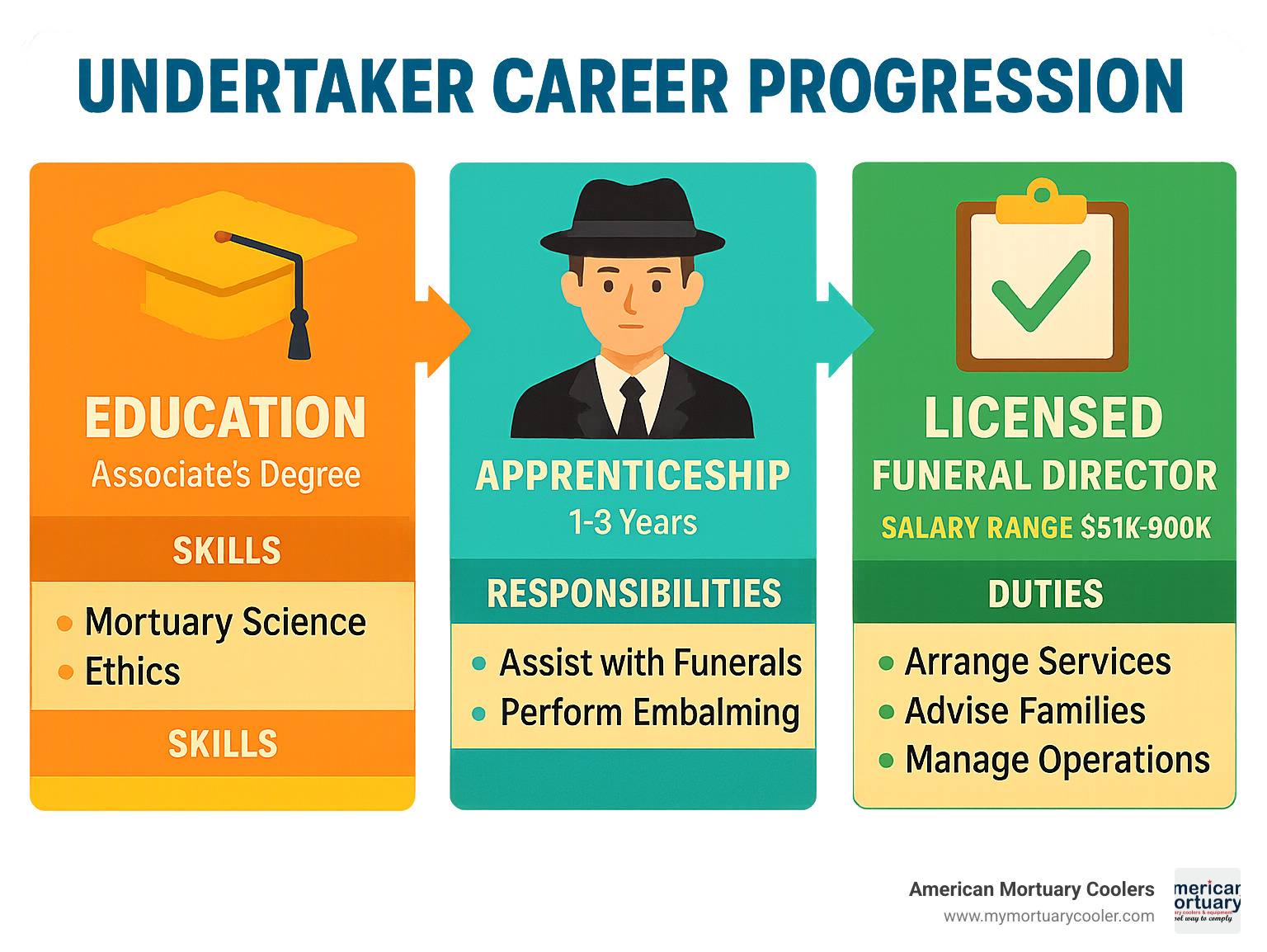
Know your undertaker job terms:
Decoding the Undertaker Job: Titles, History & Core Duties
The confusion around funeral service titles affects how you market yourself and what salary you can command. The term "undertaker" has been around since the 1400s, originally meaning anyone who "undertook" any task. It wasn't until the 1690s that people started using it specifically for funeral services.
Everything changed during the Civil War when embalmers preserved President Lincoln's body for his 1,645-mile train journey. The undertaker job transformed from simple burial services into comprehensive death care.
By 1895, "undertaker" had negative associations, so professionals started calling themselves "morticians" instead, combining the Latin word "mort" (death) with the French suffix "-icien" to sound as prestigious as "physician." The British introduced "funeral director" in 1905 to emphasize management and counseling aspects.
According to scientific research on role distinctions, about 24,200 people work in this field nationwide today. Whether you call yourself an undertaker, mortician, or funeral director, you're handling the same core responsibilities: body preparation and embalming oversight, funeral arrangement coordination, transportation logistics, legal documentation, grief counseling, and business management.
Undertaker Job Basics
An undertaker job boils down to being there for families during the worst day of their lives. You transform traumatic, chaotic situations into something meaningful and healing.
When someone dies, families are overwhelmed. They don't know what paperwork to file or how to contact insurance companies. You handle everything from technical aspects (embalming chemistry and pathology) to emotional support (grief counseling and cultural sensitivity).
Modern undertakers spend significant time on administrative work - submitting veterans' benefits applications, coordinating with insurance companies, and helping families settle financial affairs. Many funeral homes focus heavily on advance sales, requiring solid sales and marketing skills.
The reality that catches newcomers off guard: you're on call 24/7. Death doesn't happen on a convenient schedule, and this shapes everything about your career approach.
Titles Through Time: Undertaker → Mortician → Funeral Director
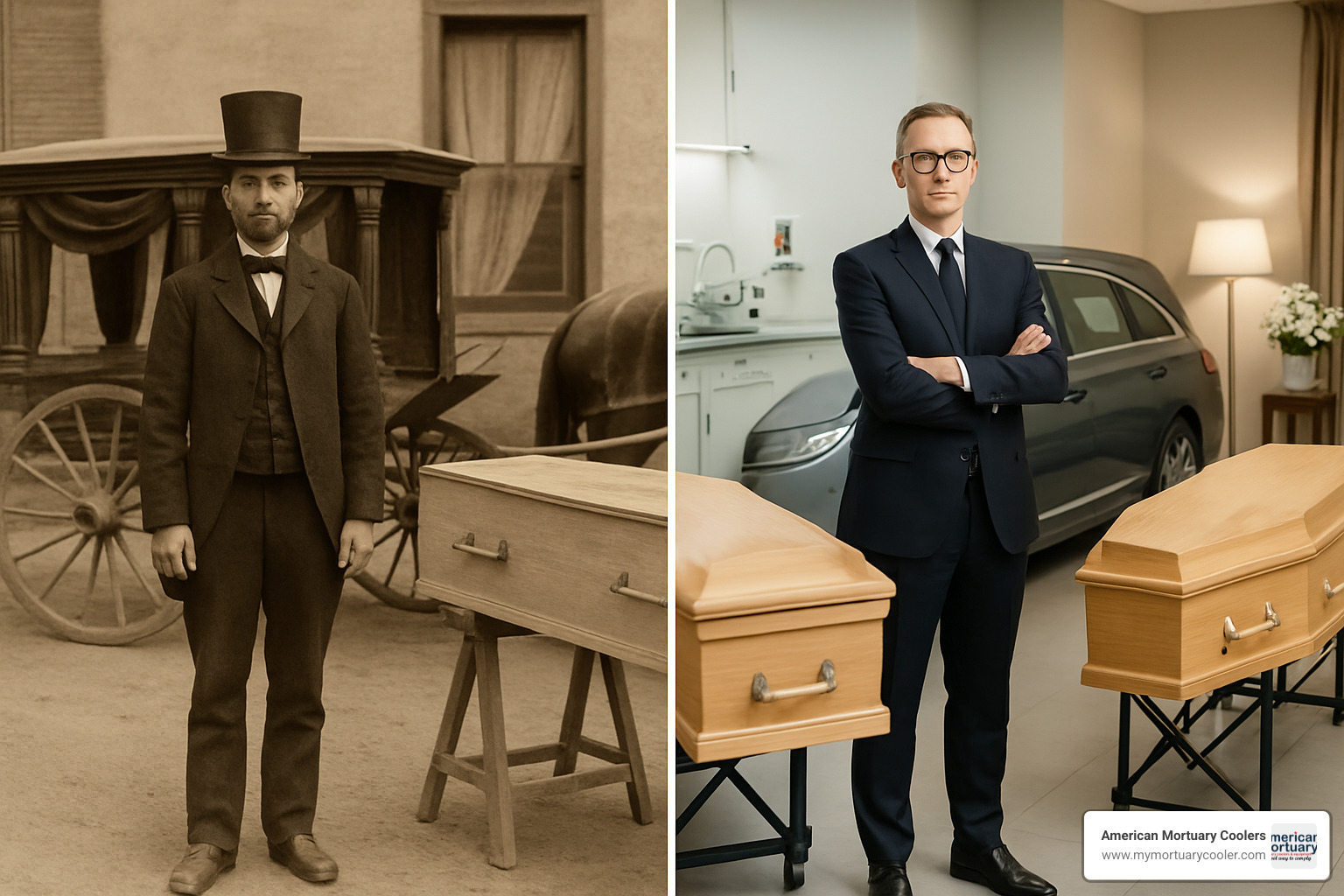
Undertaker was the original term covering basic body transport and burial services. Mortician emerged in 1895 to emphasize technical expertise and medical knowledge. Funeral Director became popular after 1905, focusing on management and counseling. Embalmer refers specifically to technical specialists who preserve bodies using chemical solutions.
"Funeral Director" typically commands the highest salaries and conveys the most authority. "Embalmer" emphasizes technical expertise that clients value. Understanding these distinctions helps you position yourself strategically in your career.
Qualifications, Education & Licensing (US-UK-Canada)
Navigating licensing requirements for an undertaker job varies dramatically by location. Most aspiring funeral directors follow: education, apprenticeship, and licensing exams.
In the United States, most states require an associate's degree in mortuary science, followed by a 1-3 year supervised apprenticeship. You'll pass both the National Board Examination and your state's licensing exam. Most states require you to be at least 21 years old for full licensure.
The United Kingdom allows undertakers to operate without formal licenses, though many join professional organizations like the British Institute of Funeral Directors. Training happens primarily through apprenticeships.
Canada requires completion of accredited funeral service programs (2-3 years), followed by provincial apprenticeships and licensing exams.
More info about Your Path to Becoming a Funeral Director breaks down state-by-state requirements.
Essential Skills for an Undertaker Job
Success requires mastering three key areas:
Technical mastery includes embalming chemistry, body preparation, and equipment operation. Knowledge of microbiology and pathology helps handle complex cases safely.
Business acumen separates good undertakers from great ones. You help families steer insurance claims, coordinate with cemeteries, and make financial decisions during emotional times.
Interpersonal skills might be most important. Cultural sensitivity matters enormously as you serve diverse communities. Crisis communication skills help guide families through difficult decisions with compassion.
Pathways: Degrees, Apprenticeships & Certifications

Associate's degrees (held by 32% of undertakers) cover embalming techniques, funeral service management, and grief counseling. These two-year programs offer lower costs and faster workforce entry.
Bachelor's degrees (held by 25.5% of funeral directors) provide broader business education alongside mortuary science. They often lead to higher starting salaries and better management preparation.
Apprenticeships provide crucial hands-on training under experienced funeral directors. Advanced certifications like crematory operator certification or grief counseling specialization can set you apart in competitive markets.
A Day in the Life: Schedule, Tools & Tech
The reality of an undertaker job is far more dynamic and people-focused than movies portray. Your day might begin with a 3 AM phone call - death doesn't follow business hours. You'll coordinate with hospitals or nursing homes for body removal while speaking compassionately with grieving family members.
After transporting the deceased, you'll complete paperwork and begin preservation procedures. Morning arrangement conferences with families are emotionally demanding - you guide grieving relatives through service preferences and handle sensitive pricing discussions.
Afternoons blend technical and administrative work: overseeing embalming, preparing bodies for viewing, filing death certificates, contacting insurance companies, and coordinating with clergy. Evening and weekend hours are common since most services happen when families can attend.
The 24/7 on-call requirement means your personal schedule revolves around death calls. Successful undertakers develop systems for managing this unpredictability while maintaining work-life balance.
More info about The Ultimate Guide to Funeral Undertaker Equipment Options covers essential tools for efficient operations.
Supporting Grieving Families
Effective grief support involves active listening, validating emotions, and providing practical guidance. Cultural competency is essential - understanding Jewish, Muslim, Hindu, Buddhist, and other religious customs prevents mistakes and shows respect.
You'll provide legal paperwork assistance, explaining death certificate processes and helping with insurance claims. Writing obituaries has evolved into an art form combining factual information with meaningful storytelling.
Tech & Tools Every Undertaker Uses
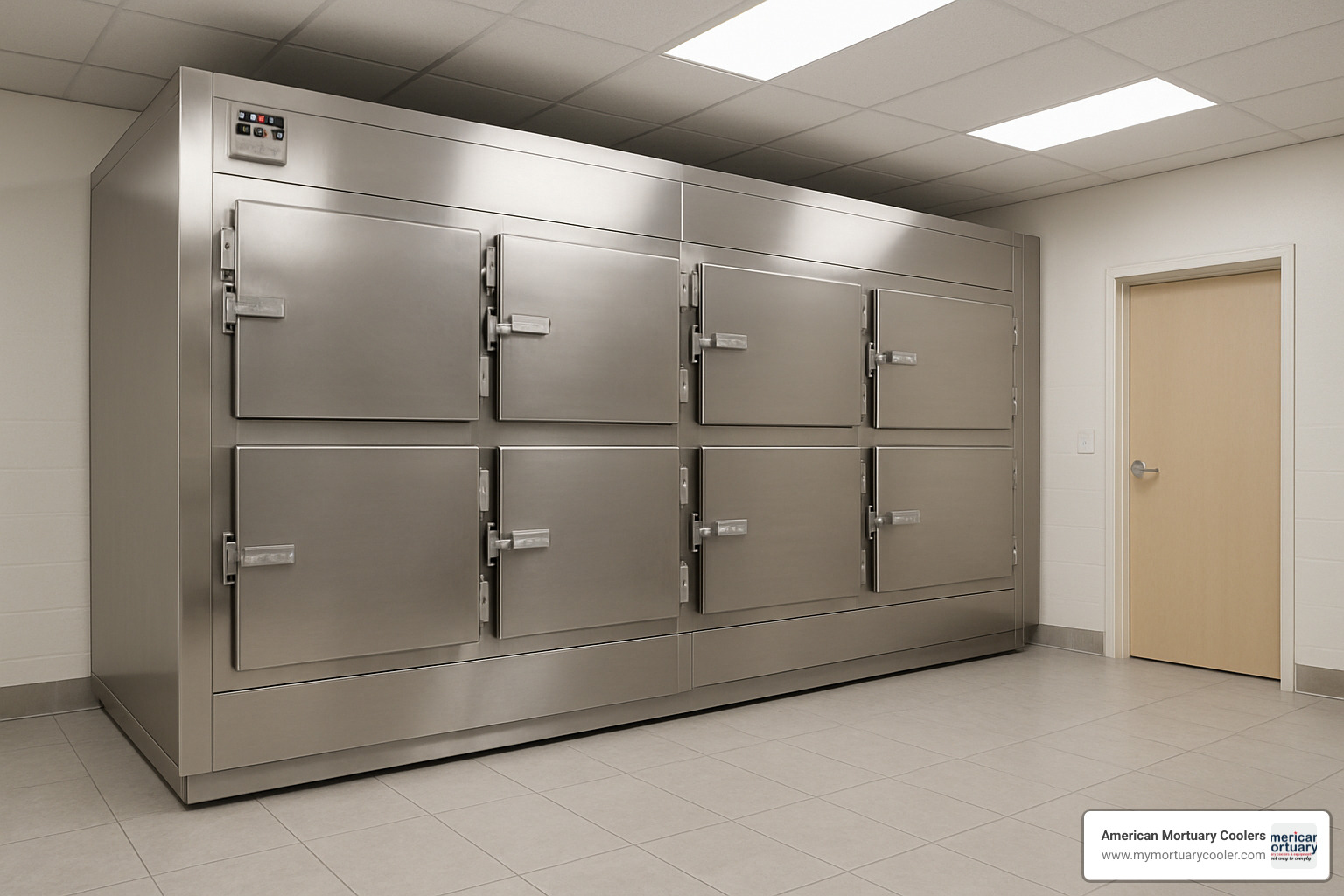
Mortuary coolers and refrigeration systems form the backbone of funeral home operations, ensuring proper body preservation while meeting health regulations. Body handling equipment like hydraulic lifts prevent injuries, while management software handles scheduling, family communication, and billing.
Preparation room technology includes embalming machines, chemical delivery systems, and ventilation equipment. At American Mortuary Coolers, we've seen how proper refrigeration directly impacts service quality and regulatory compliance, serving funeral homes across Tennessee, Georgia, Illinois, South Carolina, Texas, California, New York, and Pennsylvania.
Salary, Job Outlook & Career Progression Tips
Understanding compensation can make the difference between struggling financially and building a comfortable career. Undertaker job salaries vary dramatically based on location, experience, and positioning.
According to the Bureau of Labor Statistics, morticians earned a median annual wage of $51,030 in 2023. The top 10% earn more than $91,870 annually, while entry-level positions start around $30,660. Funeral directors specifically command higher median salaries of $74,000.
The highest-paying state is Rhode Island at $84,120 annually. Industry employment is projected to grow 8% through 2031, creating approximately 7,900 annual job openings. This exceeds the national average, driven by an aging population.
Scientific research on employment data shows the industry currently employs about 24,400 undertakers. Unlike many industries facing automation threats, the personal nature of funeral service ensures continued demand.
Negotiating Pay & Choosing Location
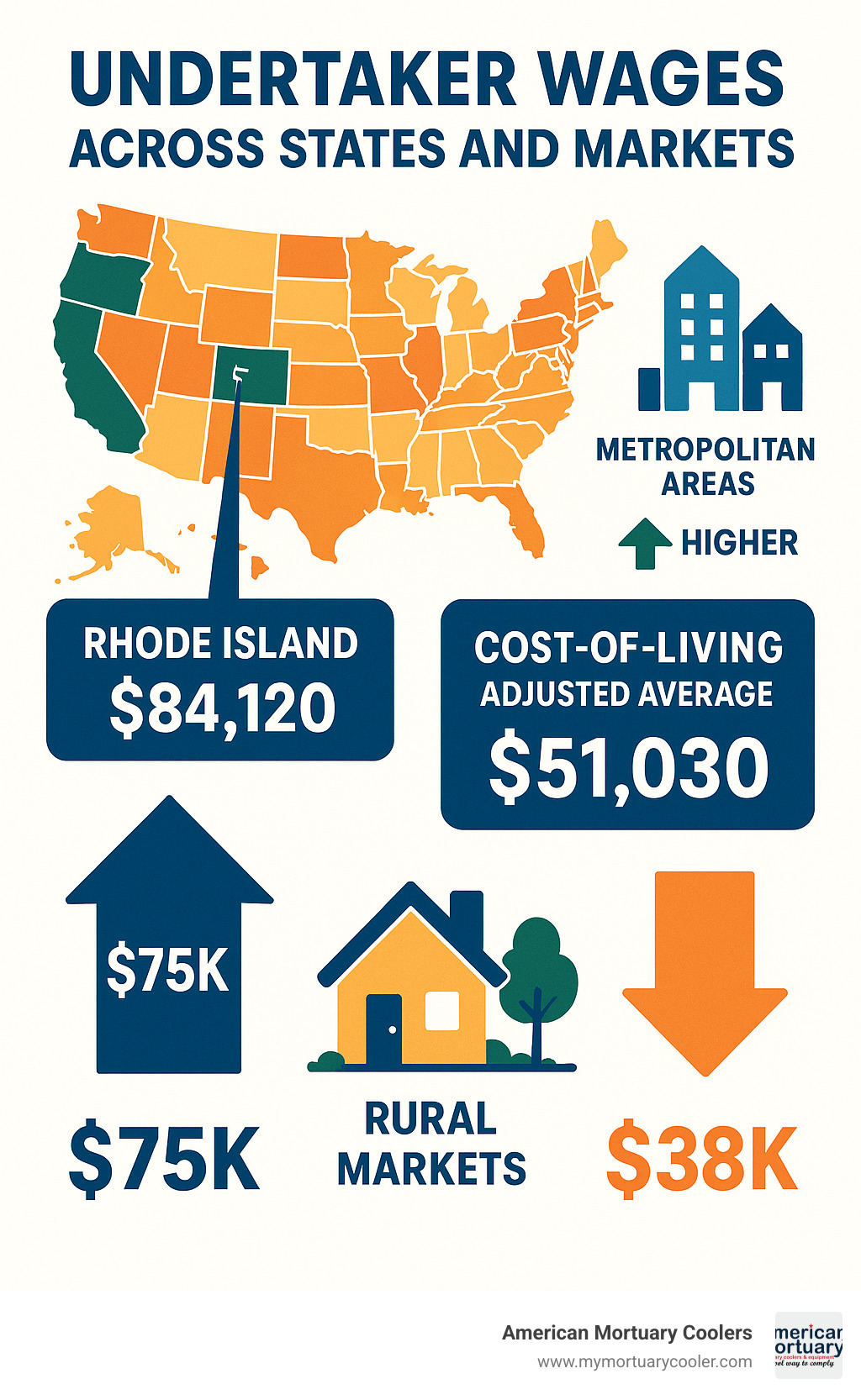
Metropolitan areas offer higher base salaries but increased living costs. Rural markets may pay less initially but offer faster advancement and lower competition.
Specialization premiums boost earning potential: Crematory operation adds $5,000-$10,000 annually, Grief counseling certification adds $3,000-$7,000, Business management experience increases earnings by $8,000-$15,000.
When negotiating, emphasize your complete skill set rather than minimum qualifications. Don't focus solely on base salary - many funeral homes offer valuable benefits including health insurance, retirement contributions, and vehicle allowances.
Climbing the Ladder: From Apprentice to Funeral Home Manager
Apprentice level (Years 1-3) pays $25,000-$35,000 annually. Licensed Funeral Director (Years 3-7) sees salaries jump to $40,000-$60,000. Senior Director/Manager positions (Years 7-15) command $60,000-$85,000. Owner/Partner level (Years 15+) offers $75,000-$150,000+.
Professional associations like the National Funeral Directors Association provide networking opportunities and continuing education that accelerate career growth.
Challenges, Rewards & Misconceptions
Working in funeral service isn't for everyone. The biggest challenge is the emotional weight of constantly supporting grieving families. Compassion fatigue is real and sneaks up on even resilient professionals.
The on-call schedule adds complexity - death doesn't check your calendar. Your personal relationships require extra understanding and flexibility. There's also the physical reality of lifting bodies, standing for hours, and working with chemicals.
But the profound satisfaction of helping families through their darkest moments keeps people in this profession for decades. Job security in funeral service is best - families will always need compassionate professionals to guide them through loss.
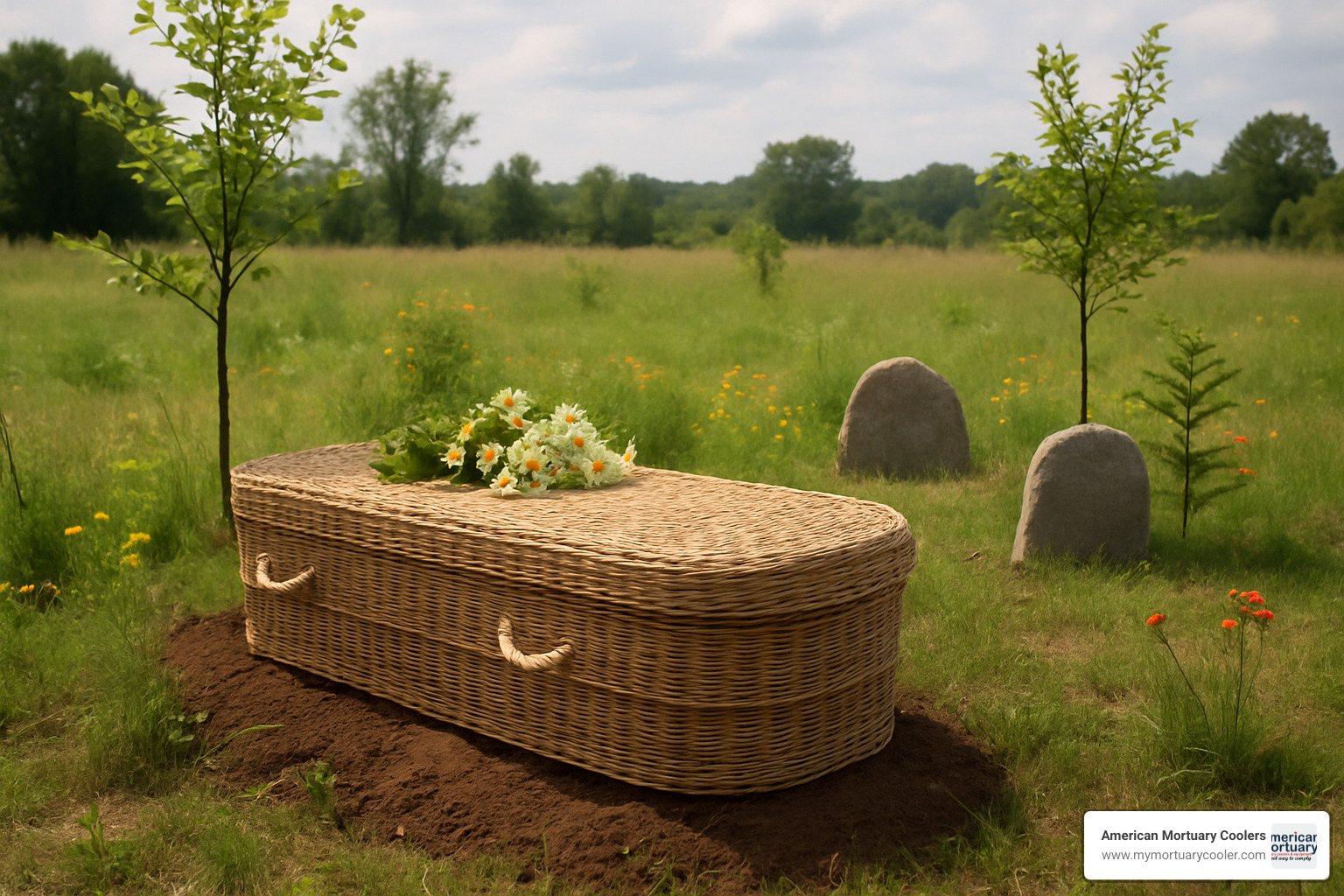
The industry is evolving with green burial trends and personalized services. These changes reward creativity and adaptability.
Emotional Resilience & Self-Care
Regular counseling or therapy isn't weakness - it's professional maintenance. Peer support groups with other funeral professionals provide unique understanding. Clear boundaries between work and personal time become essential survival skills.
Physical exercise and stress management help process emotional intensity. The funeral directors with the longest careers develop personal philosophies about death and meaning early on.
Myth-Busting the Undertaker Profession
The "morbid job for weird people" stereotype couldn't be further from reality. Most funeral directors are drawn by their desire to help others during crisis.
The "male-dominated field" assumption is rapidly outdated. Women now represent growing percentages of mortuary science students. Embalming requirements confuse many - most states don't legally require embalming, especially for cremation or immediate burial.
These misconceptions fade when people interact with actual funeral professionals. Your professionalism and community involvement speak louder than stereotypes.
Frequently Asked Questions about Undertaker Careers
What's the difference between a mortician and an undertaker?
These terms mean essentially the same thing today. Undertaker goes back to the 1400s, mortician came along in 1895 to sound more professional, and funeral director appeared in the early 1900s to emphasize management aspects. Your choice often comes down to regional preference and professional branding.
How long does licensing typically take?
The licensing journey typically spans 3-5 years: 2-4 years for degree completion, followed by 1-3 years of apprenticeship, then several months preparing for state board exams. Some states let you start apprenticeships while finishing your degree, which can reduce the timeline.
Is embalming always required by law?
Embalming is not legally required in most situations. Federal law only mandates embalming when transporting bodies across state lines. Many states require embalming only for public viewing after 24-48 hours. For immediate burial, cremation, or refrigerated storage, embalming often isn't necessary, though many families still choose it for peace of mind.
Conclusion
Starting an undertaker job offers genuine purpose alongside financial security. With 8% industry growth through 2031 and median salaries reaching $51,000 (funeral directors earning up to $74,000), you're looking at recession-proof work with meaningful impact.
Success requires combining compassion with competence - families need both emotional support and practical expertise. The industry is embracing green burial options and advanced management software, creating opportunities for professionals who adapt while honoring traditional values.
At American Mortuary Coolers, we support funeral service professionals across Tennessee, Georgia, Illinois, South Carolina, Texas, California, New York, Pennsylvania, and throughout the contiguous 48 states with custom mortuary coolers that maintain professional standards families deserve.
For those ready to begin their educational journey, More info about The Ultimate Guide to a Mortuary Science Bachelor's Degree offers comprehensive guidance for your future in funeral service.
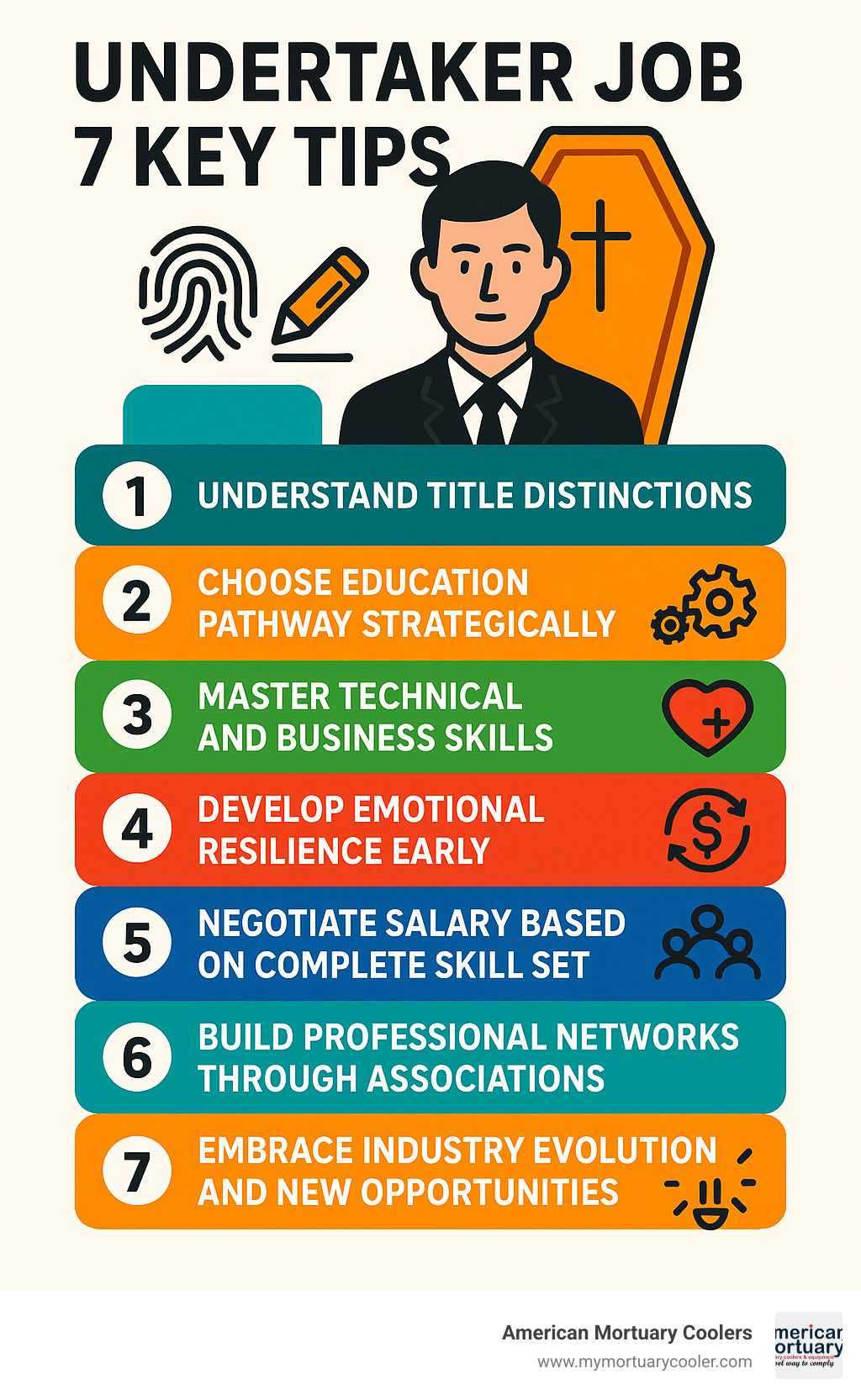
The funeral service profession needs dedicated individuals who understand that serving grieving families is both a privilege and responsibility. If you're drawn to work combining stable income with genuine impact, the undertaker job market offers a career path worth serious consideration.



